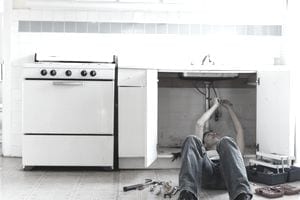
Top 10 Plumbing Problems Homeowners Face and When to Call a Plumber
Plumbing problems are a common occurrence in every household, causing inconvenience and sometimes significant damage if not addressed promptly. While some issues can be handled with a bit of DIY knowledge, others require the expertise of a professional plumber to ensure a safe and effective resolution. In this comprehensive guide, we will explore the top 10 plumbing problems homeowners face and provide insights on when it’s crucial to call a plumber.
1. Leaky Faucets
The Problem
Leaky faucets are one of the most common plumbing issues that homeowners encounter. The constant drip, drip, drip not only wastes water but can also drive you crazy with the noise. Even a small leak can waste up to 3,000 gallons of water per year, significantly impacting your water bill and the environment.
Causes
- Worn Out Washer: The most common cause of a leaky faucet is a worn-out washer. Over time, the washer, which seals the valve seat, can become stiff, torn, or dislodged.
- Corroded Valve Seat: Corrosion of the valve seat, the connection between the faucet and the spout, can also lead to leaks.
- Loose Parts: Loose or worn O-rings, gaskets, or packing nuts can cause leaks as well.
When to Call a Plumber
If you’ve replaced the washer and the faucet is still leaking, it’s time to call a plumber. A professional can identify and fix more complex issues like valve seat corrosion or worn-out internal parts. Persistent leaks may also indicate a deeper problem with your plumbing system that requires expert attention.

2. Clogged Drains
The Problem
Clogged drains are another frequent issue, causing slow drainage, bad odors, and sometimes even water backups. Whether it’s a kitchen sink, bathroom sink, shower, or bathtub, a clog can disrupt your daily routine.
Causes
- Hair: Hair is a major culprit for clogged bathroom drains, especially in showers and bathtubs.
- Food Waste: In the kitchen, food particles, grease, and oil can accumulate and block the drain.
- Soap Scum: Soap residue can build up over time, leading to blockages.
- Foreign Objects: Small objects like jewelry, toys, or sanitary products can accidentally fall into the drain and cause a clog.
When to Call a Plumber
While minor clogs can often be cleared with a plunger or a drain snake, persistent or severe clogs require professional intervention. If your efforts to unclog the drain fail or if you notice multiple drains in your home are clogged simultaneously, it’s a sign of a deeper issue in the main sewer line. A plumber has the tools and expertise to clear the blockage and prevent further damage.
3. Running Toilets
The Problem
A running toilet can waste up to 200 gallons of water per day, significantly increasing your water bill. It’s also an annoying problem that can disturb the peace and quiet of your home.
Causes
- Faulty Flapper: The flapper is a rubber seal that controls the flow of water from the tank to the bowl. If it’s worn out or misaligned, it can cause the toilet to run continuously.
- Float Issues: The float regulates the water level in the tank. If it’s set too high, water will continuously overflow into the overflow tube.
- Fill Valve Problems: A malfunctioning fill valve can also cause a running toilet.
When to Call a Plumber
If you’ve checked the flapper, float, and fill valve and the toilet is still running, it’s time to call a plumber. A professional can accurately diagnose the issue and replace any faulty components. Persistent running toilets can also be a sign of more significant plumbing problems, so it’s essential to get them checked out by an expert.

4. Low Water Pressure
The Problem
Low water pressure can make daily tasks like showering and washing dishes frustrating and time-consuming. It can affect a single fixture or be present throughout your entire home.
Causes
- Mineral Buildup: Over time, minerals in your water can accumulate in the pipes and fixtures, reducing water flow.
- Leaky Pipes: Leaks in the pipes can reduce water pressure and lead to water damage.
- Valve Issues: The main shutoff valve or the water meter valve may not be fully open.
- Pressure Regulator Problems: A malfunctioning pressure regulator can cause water pressure to be too low.
When to Call a Plumber
If cleaning the aerator or showerhead doesn’t improve water pressure, or if the issue affects multiple fixtures, it’s time to call a plumber. Low water pressure can indicate serious problems like pipe corrosion, hidden leaks, or issues with the main water supply. A professional can diagnose and resolve the problem efficiently.
5. Water Heater Issues
The Problem
Water heater problems can range from no hot water to inconsistent temperatures or even strange noises coming from the unit. These issues can disrupt your daily routine and lead to more severe problems if not addressed.
Causes
- Sediment Buildup: Sediment can accumulate at the bottom of the tank, reducing efficiency and causing noise.
- Thermostat Problems: A faulty thermostat can result in water that’s too hot or not hot enough.
- Heating Element Failure: The heating element can fail, leading to a lack of hot water.
- Leaks: Leaks around the water heater can indicate a serious issue that needs immediate attention.
When to Call a Plumber
Water heater issues can be complex and dangerous to handle on your own. If you experience any of the problems mentioned above, it’s best to call a plumber. A professional can safely diagnose and repair issues, ensuring your water heater operates efficiently and safely.

6. Burst Pipes
The Problem
Burst pipes are a plumbing emergency that can cause significant water damage to your home. They often occur during cold weather when pipes freeze and then burst as they thaw.
Causes
- Freezing Temperatures: Water expands when it freezes, putting pressure on the pipes until they burst.
- Corrosion: Older pipes can corrode over time, weakening the pipe walls and leading to bursts.
- High Water Pressure: Excessively high water pressure can cause pipes to burst.
- Physical Damage: Accidental damage from construction or renovations can cause pipes to burst.
When to Call a Plumber
If you experience a burst pipe, turn off the main water supply immediately and call a plumber. Burst pipes can cause extensive damage quickly, so it’s crucial to get professional help as soon as possible. A plumber can repair or replace the damaged pipes and advise on preventing future occurrences.
7. Sewer Line Issues
The Problem
Sewer line problems are serious and can lead to unpleasant odors, slow drains, and even sewage backups in your home. These issues require immediate attention to prevent health hazards and property damage.
Causes
- Tree Roots: Tree roots can infiltrate sewer lines, causing blockages and damage.
- Pipe Deterioration: Over time, sewer pipes can deteriorate, leading to leaks and blockages.
- Grease Buildup: Pouring grease down the drain can cause it to solidify and block the sewer line.
- Foreign Objects: Non-biodegradable items flushed down the toilet can cause blockages.
When to Call a Plumber
Sewer line issues are not DIY projects. If you suspect a problem with your sewer line, call a plumber immediately. Professional plumbers have the equipment, like sewer cameras and hydro jetting, to diagnose and clear blockages or repair damaged lines effectively.

8. Dripping Showerheads
The Problem
A dripping showerhead is not only annoying but also wastes water and increases your utility bills. Even a slow drip can waste several gallons of water a day.
Causes
- Worn Out Washer: Like leaky faucets, a worn-out washer is a common cause of a dripping showerhead.
- Valve Issues: The shower valve controls the flow of water and can wear out over time.
- Mineral Buildup: Hard water can cause mineral deposits to build up, affecting the showerhead’s performance.
When to Call a Plumber
If replacing the washer doesn’t stop the drip or if you notice other issues with your shower, it’s time to call a plumber. A professional can replace faulty components and clean out mineral buildup, ensuring your shower works efficiently.
9. Garbage Disposal Problems
The Problem
Garbage disposal issues can range from jams and clogs to strange noises and leaks. A malfunctioning garbage disposal can disrupt your kitchen routine and lead to unpleasant odors.
Causes
- Overloading: Putting too much food waste down the disposal can cause jams and clogs.
- Improper Items: Disposing of non-food items or fibrous foods like celery can damage the disposal.
- Wear and Tear: Over time, the components of the garbage disposal can wear out, leading to leaks and inefficiency.
When to Call a Plumber
If your garbage disposal is jammed, making strange noises, or leaking, it’s best to call a plumber. Attempting to fix it yourself can be dangerous and may cause further damage. A professional can safely repair or replace the disposal, restoring your kitchen’s functionality.

10. Sump Pump Failure
The Problem
A sump pump is crucial for preventing basement flooding, especially during heavy rain. If your sump pump fails, it can lead to significant water damage and costly repairs.
Causes
- Power Failure: Sump pumps rely on electricity, and power outages can cause them to stop working.
- Clogged Discharge Lines: Debris or frozen discharge lines can prevent the sump pump from expelling water.
- Switch Problems: The switch, which turns the pump on and off, can get stuck or fail, rendering the pump ineffective.
- Aging Pump: Sump pumps typically last around 10 years. An aging pump may fail due to wear and tear.
When to Call a Plumber
If your sump pump stops working, shows signs of wear, or you notice water accumulation in your basement, call a plumber immediately. A professional can inspect, repair, or replace the sump pump to ensure your home stays dry and protected.
Why Professional Intervention is Crucial
While many homeowners are capable of handling minor plumbing issues, some problems necessitate professional intervention to prevent further damage and ensure the job is done correctly. Here’s why calling a professional plumber can be the best decision:
Expertise and Experience
Professional plumbers have the training and experience to diagnose and fix a wide range of plumbing issues efficiently. They can quickly identify the root cause of the problem and use their expertise to apply the most effective solution.
Proper Tools and Equipment
Plumbers have access to specialized tools and equipment that are not typically available to homeowners. These tools allow them to perform tasks like clearing deep clogs, inspecting sewer lines with cameras, and making precise repairs.
Long-Term Solutions
DIY fixes may provide temporary relief but often don’t address the underlying issues. A professional plumber ensures long-term solutions, reducing the likelihood of recurring problems. This approach can save you money and hassle in the long run.
Safety Considerations
Some plumbing issues, like burst pipes or water heater problems, can pose safety risks. Professional plumbers are trained to handle these situations safely, preventing injury and further damage to your home.

Preventative Plumbing Maintenance
Regular maintenance can prevent many of the common plumbing problems discussed above. By taking proactive measures, homeowners can extend the lifespan of their plumbing systems and avoid costly repairs. Here are some tips for preventative plumbing maintenance:
Regular Inspections
Conduct regular inspections of your plumbing system to identify potential issues early. Check for leaks, corrosion, and signs of wear and tear on pipes and fixtures.
Clean Drains Regularly
Prevent clogs by cleaning drains regularly. Use drain covers to catch hair and food particles, and avoid pouring grease down the kitchen sink. Periodically use a mixture of baking soda and vinegar to keep drains clear.
Test Water Pressure
Check your water pressure regularly to ensure it’s within the recommended range (40-60 psi). High water pressure can damage pipes and fixtures, while low pressure can indicate underlying issues.
Flush Water Heater
Flush your water heater annually to remove sediment buildup. This simple maintenance task can improve efficiency and extend the lifespan of the unit.

When to Call a Plumber for Maintenance
While many maintenance tasks can be performed by homeowners, some require professional expertise. Consider scheduling a plumber for the following maintenance services:
Annual Plumbing Inspection
An annual inspection by a professional plumber can identify and address potential issues before they become major problems. This comprehensive checkup includes inspecting pipes, fixtures, water heaters, and more.
Water Heater Maintenance
Water heaters require regular maintenance to operate efficiently. A plumber can perform tasks like flushing the tank, checking the anode rod, and inspecting the thermostat and heating elements.
Sewer Line Inspection
A professional sewer line inspection can detect blockages, tree root intrusions, and pipe deterioration. This service is especially important for older homes or those with large trees nearby.
The Cost of Hiring a Plumber
The cost of hiring a plumber can vary widely depending on the complexity of the job, the plumber’s experience, and your location. Here are some general price ranges for common plumbing services:
Leaky Faucet Repair
Fixing a leaky faucet typically costs between $75 and $200, depending on the severity of the leak and the type of faucet.
Clogged Drain Clearing
Clearing a clogged drain can cost between $100 and $300. Severe blockages or issues with the main sewer line may cost more.
Water Heater Repair or Replacement
Repairing a water heater usually costs between $150 and $500. Replacing a water heater can cost between $1,000 and $3,500, depending on the type and size of the unit.
Sump Pump Repair or Replacement
Repairing a sump pump typically costs between $200 and $600. Replacing a sump pump can range from $400 to $1,200.

Tips for Choosing the Right Plumber
When selecting a plumber, it’s important to choose someone who is reliable, experienced, and trustworthy. Here are some tips for finding the right plumber for your needs:
Check Credentials
Ensure the plumber is licensed and insured. A licensed plumber has met the necessary training and experience requirements, and insurance protects you in case of accidents or damage.
Read Reviews
Look for reviews and testimonials from previous customers. Positive feedback can give you confidence in the plumber’s ability to provide quality service.
Get Multiple Quotes
Obtain quotes from several plumbers to compare prices and services. Be wary of unusually low or high estimates, and choose a plumber who offers a fair and transparent pricing structure.
Ask for References
Ask the plumber for references from previous clients. Speaking with past customers can provide insight into the plumber’s reliability, workmanship, and professionalism.
Plumbing problems are an inevitable part of homeownership, but knowing when to call a professional plumber can save you time, money, and stress. By understanding the top 10 plumbing problems homeowners face and the importance of timely intervention, you can protect your home from potential damage and ensure a well-functioning plumbing system.

Leave a Reply